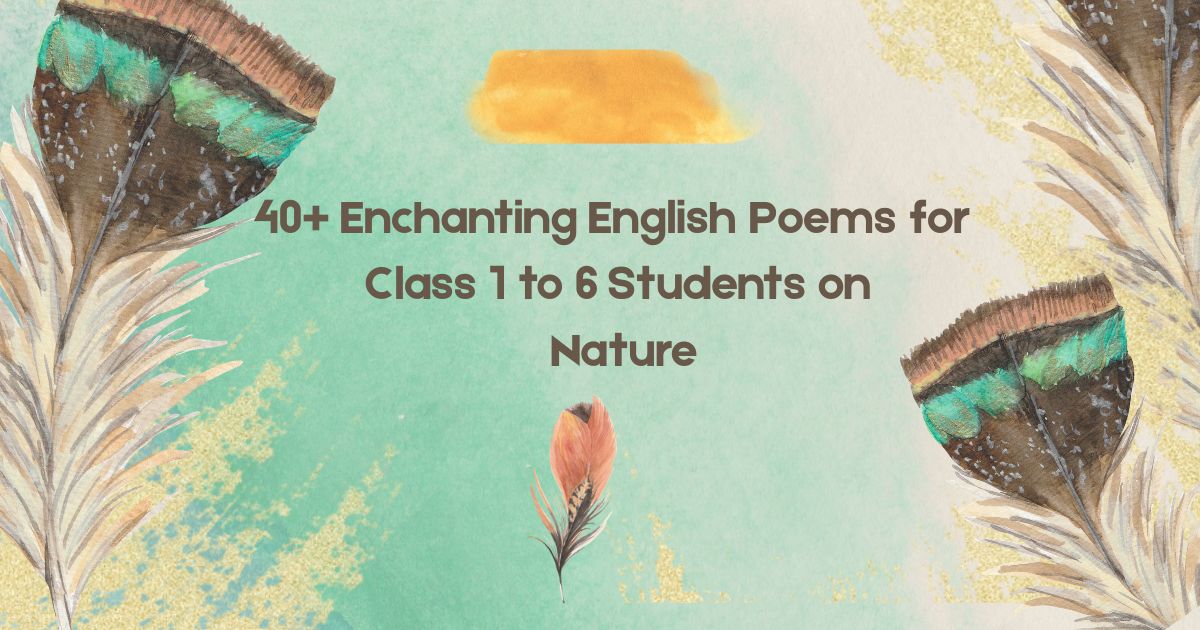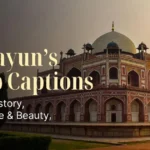Poetry serves as a magical bridge connecting children with the natural world around them. These carefully curated English poems for class 1 to 6 on nature transform ordinary classroom moments into extraordinary learning adventures. Through rhythmic verses and vivid imagery, young minds develop both linguistic prowess and environmental consciousness that lasts a lifetime.
Class 1 Nature Poems: First Steps into Poetry’s Garden
Ages 5-6 represent the most receptive period for introducing poetic language patterns. These foundational verses employ simple vocabulary, repetitive structures, and familiar natural elements that resonate with beginning readers. The rhythmic patterns in these nature poems help develop phonemic awareness while fostering appreciation for Earth’s wonders.
“Sunshine Yellow”
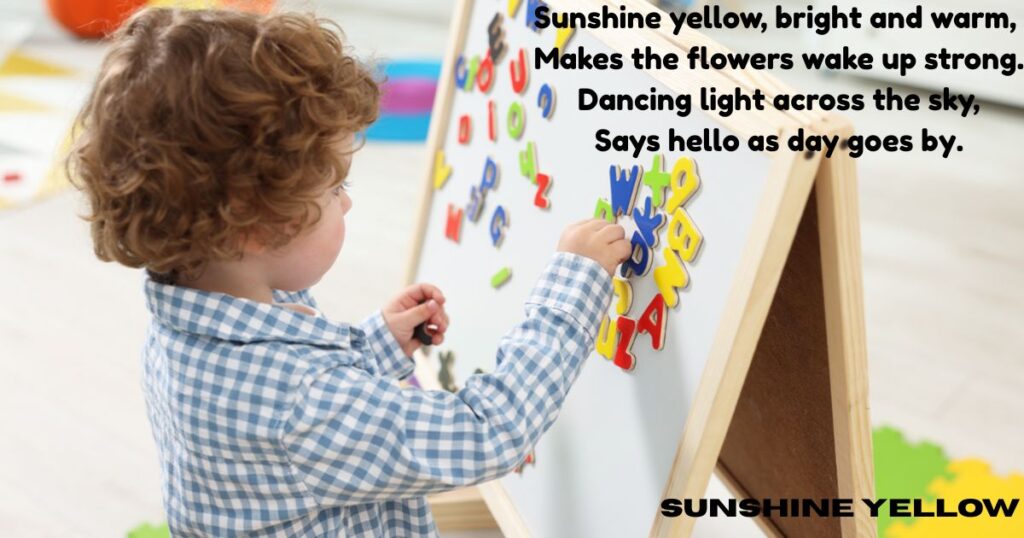
Sunshine yellow, bright and warm,
Makes the flowers wake up strong.
Dancing light across the sky,
Says hello as day goes by.
This cheerful verse introduces young learners to color associations and personification through sunshine’s friendly greeting.
“Little Raindrop”
Pitter-patter, here I come,
Little raindrop having fun.
Splash and dance on leaves so green,
Prettiest drops you’ve ever seen.
Children connect with rain’s playful nature while learning onomatopoeia through “pitter-patter” sounds.
“Buzzing Bee”
Buzz, buzz, busy bee,
Flying flower, tree to tree.
Making honey, golden sweet,
Nature’s worker, can’t be beat.
This poem introduces ecological concepts about pollination while emphasizing bees’ important environmental role.
“Green Grass Dance”
Green grass dancing in the breeze,
Tickling toes and bending knees.
Soft and cool beneath my feet,
Nature’s carpet, oh so neat.
Tactile imagery helps children experience grass through multiple senses and movement.
“Fluffy White Clouds”
Fluffy clouds like cotton balls,
Floating high above us all.
Changing shapes throughout the day,
In the sky they love to play.
Visual metaphors comparing clouds to familiar objects develop creative thinking and observation skills.
“Chirping Birds”
Chirp, chirp, little bird,
Singing songs that I have heard.
Morning music, sweet and clear,
Nature’s concert for my ear.
Auditory elements introduce children to birds as nature’s musicians while developing listening appreciation.
“Pretty Flowers”
Pretty flowers, red and blue,
Yellow, pink and purple too.
Growing tall in garden beds,
Nodding their colorful heads.
Color recognition combines with botanical awareness as children learn about garden diversity.
“Big Blue Sky”
Big blue sky so wide and high,
Stretches far beyond my eye.
Day and night it watches me,
Sky’s my friend eternally.
This poem establishes emotional connections between children and celestial elements while introducing spatial concepts.
More Post:30+ English Poems for Class 3 on Nature
Class 2 Nature Poems: Expanding Horizons
Second-grade students possess enhanced vocabulary and reading comprehension that allows for more complex nature themes. These poems introduce scientific concepts through accessible language while maintaining the musical quality essential for memorization and recitation. The verses explore diverse ecosystems and natural phenomena.
“The Busy Butterfly”
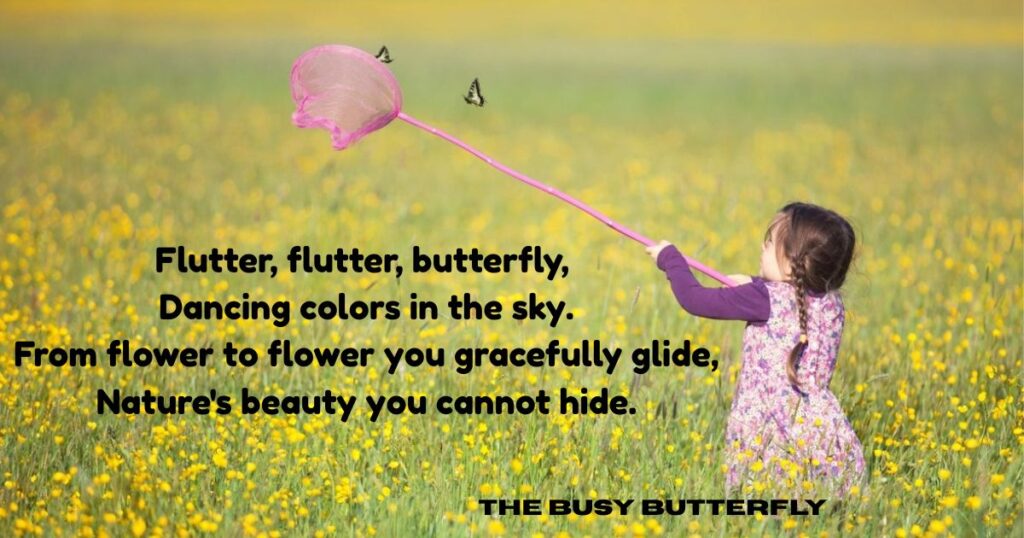
Flutter, flutter, butterfly,
Dancing colors in the sky.
From flower to flower you gracefully glide,
Nature’s beauty you cannot hide.
Metamorphosis concepts subtly emerge while children observe butterfly behavior and appreciate natural grace.
“Ocean Waves Hello”
Ocean waves come rolling in,
Foamy white with salty grin.
Crashing, splashing on the shore,
Always coming back for more.
Marine environments become accessible through rhythmic wave patterns that mirror actual ocean sounds.
“Mighty Mountain Tall”
Mountain tall and mountain grand,
Rocky giant of the land.
Snow-capped peak that touches sky,
Ancient sentinel standing high.
Geological features gain personality while introducing concepts of permanence and natural majesty.
“Autumn Leaves Falling”
Red and gold leaves spinning down,
Nature’s confetti all around.
Crunching softly ‘neath my feet,
Autumn’s carpet, crisp and neat.
Seasonal transitions become tangible experiences through sensory descriptions and colorful imagery.
“Gentle Breeze Whispers”
Gentle breeze whispers secrets low,
Through the trees it loves to go.
Cooling faces, moving hair,
Invisible friend that’s everywhere.
Wind personification helps children understand atmospheric movement while developing imaginative thinking.
14. “Sparkly Morning Dew”
Morning dew like diamonds bright,
Sparkling in the early light.
Tiny drops on grass and leaves,
Nature’s jewelry never grieves.
Water cycle concepts introduce through beautiful imagery that makes scientific processes memorable.
“Rainbow After Rain”
After rain comes rainbow bright,
Seven colors, what a sight!
Arching high across the sky,
Nature’s promise way up high.
Meteorological phenomena become magical experiences while subtly introducing light refraction concepts.
“Forest Friends”
In the forest, friends abound,
Squirrels, rabbits can be found.
Deer and birds and insects too,
Forest family, me and you.
Ecosystem relationships develop through inclusive language that positions humans as forest community members.
More Posts:25+ English Poems for Class 2 Recitation Competition
Class 3 Nature Poems: Deeper Nature Connections
Third-grade learners demonstrate increased analytical thinking and emotional maturity that supports more complex environmental themes. These nature poems for elementary students introduce interdependence concepts while maintaining lyrical beauty. The verses encourage observational skills and scientific curiosity about natural processes.
“The Wise Old Oak Tree”
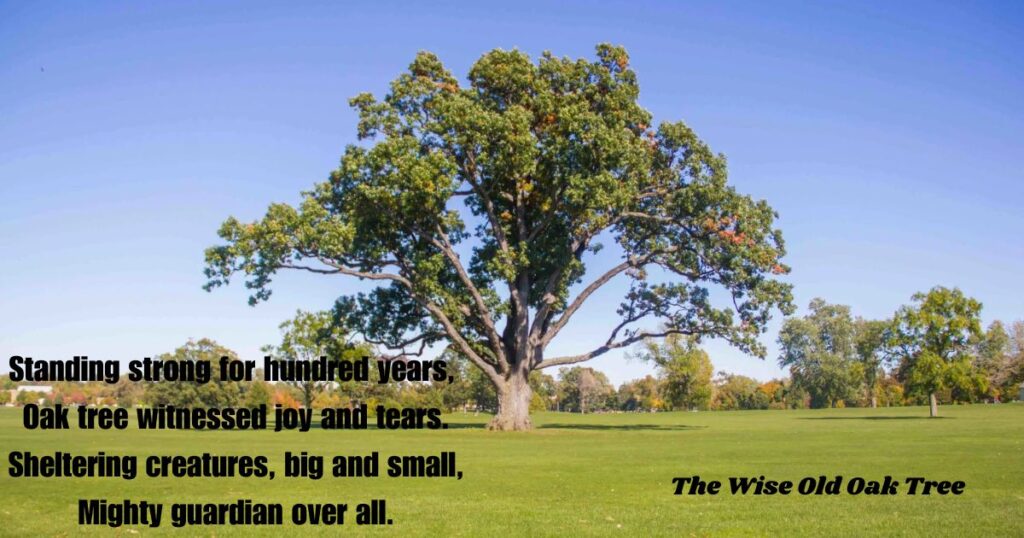
Standing strong for hundred years,
Oak tree witnessed joy and tears.
Sheltering creatures, big and small,
Mighty guardian over all.
Tree longevity and habitat provision concepts emerge through personification and historical perspective.
“Desert Sand Adventures”
Golden sand dunes, hot and dry,
Beneath the blazing desert sky.
Cactus brave and lizards quick,
Desert life knows every trick.
Adaptation strategies in harsh environments showcase nature’s remarkable resilience and survival mechanisms.
“Snowflake Ballet”
Snowflakes dancing, one by one,
Winter’s ballet has begun.
Each unique design so fine,
Nature’s art in crystalline.
Mathematical patterns in nature combine with artistic appreciation while introducing uniqueness concepts.
“River’s Journey”
From mountain high to ocean blue,
River travels, ever true.
Carrying life from place to place,
Water’s journey shows nature’s grace.
Hydrological cycles become adventure stories while demonstrating connectivity across ecosystems.
“Garden Symphony”
Bees are humming, birds are singing,
Garden bells are gently ringing.
Leaves are rustling, flowers swaying,
Nature’s orchestra is playing.
Acoustic ecology introduces through musical metaphors that encourage active listening in natural environments.
“Moonlit Night”
Silver moon lights up the dark,
While the owl gives warning bark.
Stars like diamonds pierce the night,
Nature sleeps in gentle light.
Nocturnal ecosystems expand environmental awareness beyond daylight hours while introducing celestial navigation.
“Seasonal Changes”
Spring brings flowers, summer heat,
Autumn’s harvest, winter’s sleet.
Round and round the seasons go,
Nature’s rhythm we all know.
Cyclical patterns in nature demonstrate temporal relationships and predictable environmental changes.
“Animal Kingdom”
Lions roar and eagles soar,
Whales sing songs from ocean floor.
Every creature, great and small,
Has a purpose, one and all.
Biodiversity appreciation develops through inclusive representation of various animal species and habitats.
More Posts:40+ Famous English Poems For Class 1 to 6 Recitation Competition
Class 4 Nature Poems: Environmental Awareness Blossoms
Fourth-grade students possess cognitive development necessary for understanding environmental challenges and conservation concepts. These English poems for class 1 to 6 progress toward ecological responsibility while maintaining hope and actionable solutions. The verses balance environmental awareness with empowerment rather than overwhelming young minds.
“Protecting Our Earth”
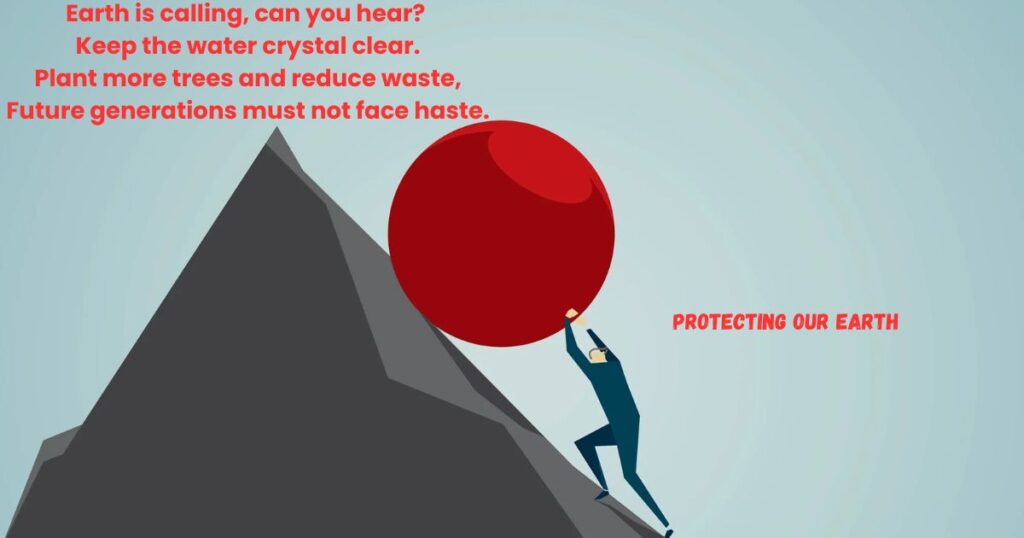
Earth is calling, can you hear?
Keep the water crystal clear.
Plant more trees and reduce waste,
Future generations must not face haste.
Conservation actions become personal responsibility while connecting individual choices to global outcomes.
“Coral Reef Wonders”
Beneath the waves, a city bright,
Coral reefs, a wondrous sight.
Fish of every color swim,
But reefs grow weak when oceans dim.
Marine ecosystems and climate change impacts introduce through underwater exploration metaphors.
“Endangered Species Call”
Tigers, pandas, whales at sea,
Need our help to live and be free.
Every species has its place,
In nature’s web, we share this space.
Species preservation concepts develop empathy while introducing food web relationships.
“Pollution’s Shadow”
Smoke and trash cloud nature’s face,
Animals searching for clean space.
But together we can make it right,
Turn pollution’s shadow into light.
Environmental problems present with solution-focused messaging that empowers rather than discourages.
“Climate Change Concerns”
Weather patterns changing fast,
Will nature’s balance always last?
We can help by using less,
Give our planet time to rest.
Climate science becomes accessible through observable weather changes and personal action steps.
“Recycling Heroes”
Bottles, cans, and paper too,
Can be made into something new.
Recycling heroes, that’s what we are,
Helping Earth both near and far.
Circular economy concepts transform children into environmental heroes through everyday actions.
“Natural Resources”
Water, air, and fertile ground,
Precious gifts that can be found.
Use them wisely, use them well,
Future stories they will tell.
Resource stewardship develops through gratitude and forward-thinking perspectives.
“Ecosystem Balance”
Every part plays its role,
Making ecosystems whole.
Remove one piece, the system shakes,
Balance is what nature makes.
Ecological interdependence concepts demonstrate systems thinking and cause-effect relationships.
More Posts:30+ English Poems for Class 3 on Nature
Class 5 Nature Poems: Advanced Literary Appreciation
Fifth-grade students demonstrate sophisticated comprehension that supports complex environmental themes and advanced literary devices. These nature poems for elementary students incorporate scientific accuracy with poetic beauty while encouraging critical thinking about human-environment relationships. The verses prepare students for deeper ecological understanding.
“Mother Nature’s Resilience”
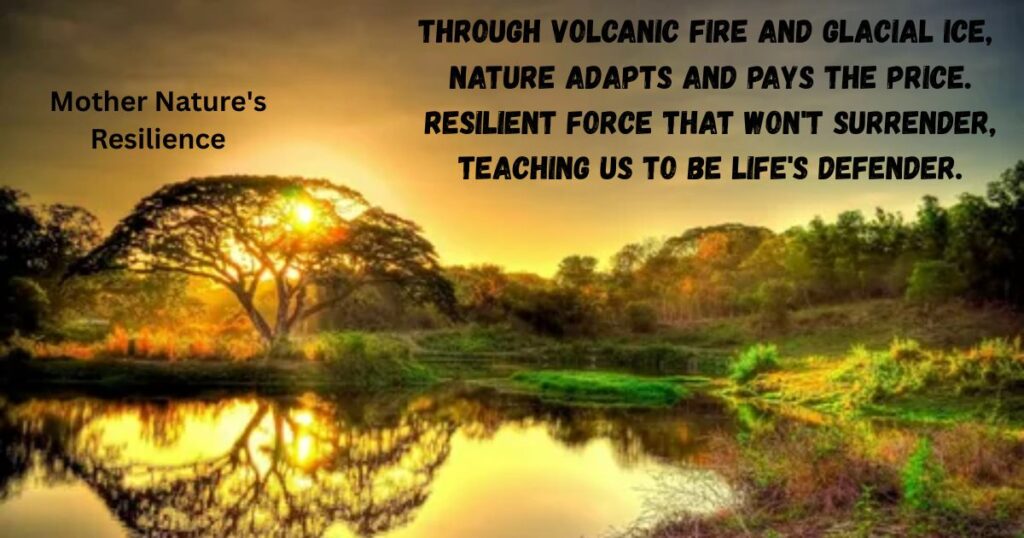
Through volcanic fire and glacial ice,
Nature adapts and pays the price.
Resilient force that won’t surrender,
Teaching us to be life’s defender.
Geological timescales and natural disasters showcase environmental adaptability and recovery processes.
“Photosynthesis Magic”
Green leaves capture sunlight bright,
Transform it into life’s delight.
Oxygen flows for all to share,
Magic happens everywhere.
Biochemical processes become accessible science while emphasizing plant-animal interdependence.
“Geological Time”
Mountains rise and canyons form,
Through countless years of wind and storm.
Earth’s slow dance of rock and stone,
Time’s patience clearly shown.
Deep time concepts expand temporal thinking beyondhuman timeframes toward geological perspectives.
“Migration Mysteries”
Geese fly south, whales travel far,
Following nature’s ancient star.
Built-in compass guides their way,
Migration mysteries night and day.
Animal navigation and seasonal movements introduce biological adaptation and inherited behaviors.
“Biodiversity Celebration”
Million species call Earth home,
From desert dry to ocean foam.
Each one special, each one unique,
Diversity is what we seek.
Species richness and habitat variety celebrate biological complexity and evolutionary success.
“Conservation Champions”
Scientists study, activists fight,
Working hard to make things right.
Every child can join the cause,
Give nature’s future hopeful pause.
Career connections in environmental fields inspire future pathways while emphasizing collective action.
More Posts:English Elocution Poems for Class 7
Class 6 Nature Poems: Mature Environmental Perspectives
Sixth-grade learners approach adolescent thinking that supports abstract concepts and global environmental issues. These advanced English poems for class 1 to 6 integrate scientific knowledge with ethical considerations while maintaining optimistic solutions. The verses prepare students for secondary environmental education and civic engagement.
“Sustainable Future Vision”

Renewable energy, clean and bright,
Solar panels catching light.
Wind turbines spinning in the breeze,
Sustainable future brings us ease.
Alternative energy concepts and technological solutions demonstrate human innovation for environmental challenges.
“Human-Nature Harmony”
Cities green with rooftop farms,
Nature wrapped in human arms.
Balance found ‘tween growth and care,
Harmony breathes in the air.
Urban ecology and sustainable development showcase coexistence possibilities between civilization and nature.
“Wilderness Preservation”
Untouched forests, pristine streams,
Wild places fulfill nature’s dreams.
Protected lands for all to share,
Wilderness beyond compare.
Conservation areas and biodiversity hotspots emphasize preservation importance for future generations.
“Global Environmental Unity”
Across the world, hands unite,
Fighting for what’s just and right.
One planet, one shared goal,
Healing Earth, making it whole.
International cooperation and global citizenship concepts encourage worldwide environmental solidarity.
“Nature’s Scientific Secrets”
DNA codes and quantum dance,
Nature’s mysteries enhance.
Science reveals what eyes can’t see,
Complexity and harmony.
Advanced scientific concepts like genetics and physics connect to natural phenomena and discovery.
“Earth’s Ancient Wisdom”
Billions of years of trial and test,
Nature knows what works the best.
Biomimicry shows the way,
Learning from Earth every day.
Evolutionary processes and biomimetic innovation demonstrate nature-inspired technology and sustainable design.
Conclusion
These 40+ English poems for class 1 to 6 on nature create a comprehensive learning journey from simple observation to sophisticated environmental understanding. Progressive complexity ensures age-appropriate engagement while building scientific literacy and ecological consciousness. Poetry’s power transforms abstract environmental concepts into memorable, meaningful experiences that shape tomorrow’s environmental stewards.

Admin of https://aspirenowa.com/. Sharing Touching and Thoughtful Poems for all Hearts. I Believe in Simple Words, Deep Meaning, and Inspiring Emotions through Poetry for Every Reader.
